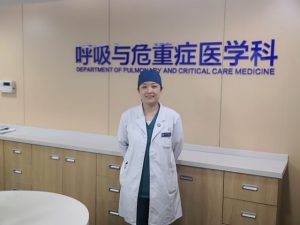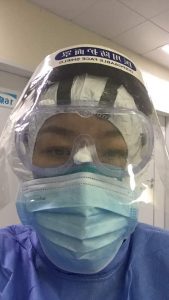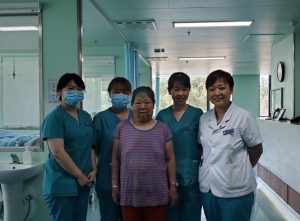Dr. Li Yan, one of the 40,000 Chinese doctors who went to help during the lockdown in Wuhan gave an interview to former VRT (Belgian public radio and tv) journalist Ng Sauw Tjhoi, who has been studying and covering China for years.
(13 May 2020)
Introduction
During the lockdown in Wuhan there was no applause at 8pm, but “people hung banners out of their windows, ‘Go Wuhan, go China!’, That’s the way we were encouraged and shown appreciation”, Dr. Li Yan tells me in a Zoom interview that she has granted me. I had thought her testimony very moving, earlier in May, during a webinar organized by the Beijing People’s Association for Friendship with Foreign Countries, Beijing NGO Network for International Exchanges and Beijing Medical Women’s Association (May 13, 2020).
The lockdown full force in Wuhan made some 11 million inhabitants “stay home, stay safe” between January 23 and April 8, or 76 days. More than 40,000 doctors and many more nursing staff joined the fight against COVID-19 in Wuhan, along with the 1.5 million volunteers from the city itself (14% of the local population). Dr. Li Yan is one of the doctors who volunteered. An active woman of 43, mother of a son of 6, married. “When my husband and I got married, I warned him that I was a workaholic, (she laughs). Sometimes I should take some more time off and spend time with my family.” She sometimes works for days on end. There’s no time clock for saving people’s lives. But going to help in Wuhan? Still, I decided for myself pretty soon, I must go there. “I see a cheerful Chinese doctor in a surgical cap and a white doctor’s apron on my laptop screen. Even though it’s virtual reality, the tone has been set.
Dr. Li Yan, you work and live in Beijing, You have been working as an intensive care physician in the Pulmonary and Respiratory Diseases Department of The University Central Hospital Xuanwu for over 18 years, had you treated Covid-19 patients in your hospital before you went to Wuhan?
“No, I treated my first Covid-19 patients in Wuhan. At the end of January there were no corona patients in Beijing. My department has 12 beds. Then there were patients with other conditions. But we heard a lot of reports about Wuhan. And in our hospital, the management had already made an urgent appeal for volunteers. I put myself on the list pretty soon. First, of course, I consulted with my husband. We still have a 6-year-old son and we take care of my parents too. But they all told me to go. I am very grateful to them; it was not an easy decision for them!
You yourself have decided quickly and decisively, why are you taking such a risk, as you were already aware that it was a dangerous virus, otherwise there would not have been a lockdown?
“True, … Well, I’m just an ordinary person, you know, I’m a simple doctor, I try to do my job as best as I can every day. But we know from previous virus outbreaks that it is necessary to get started very quickly and with many hands. A virus doesn’t rest either, does it? And for me personally, it was also an opportunity to improve my medical knowledge and gain more experience. I feel that as a doctor I have a duty to help every human being, wherever I am. And, you know, I also want to live up to my ideals of humanity and service in my medical work. I’m really no exception.” (laughs)
Could you tell us how the preparation of the relief mission to Wuhan was handled and what this meant for you?
“You know that the outbreak of the virus coincided with the Chinese New Year. For us that is a family celebration, also with some days off, and everyone comes home and there is a friendly atmosphere all around. But during the festival I already felt that ‘duty would call soon’, because it became clear that there would be a great need for doctors with qualifications like I have. On the third day of the New Year, January 27th, I received a text message from the hospital that a support team had to be formed. I got the message just before lunchtime, and we had to be at the airport at two o’clock. So, I had very little time to pack and say goodbye.”

How was the support team assembled? And… are you actually a member of the Communist Party?
(Laughs out loud) “Of course I am a member of the CPC (via Zoom she proudly shows her pin fastened on her white apron) and our team consisted for about half of members and for the other half non-members of the party. There were 136 of us, including 100 nursing staff and 36 doctors. All volunteers. We took the plane in which 5 tons of medical equipment was taken but also many things for daily use and food. Many of us also had packs of instant noodles.”
I see, typical, isn’t it! Were you nervous when you got on the plane?
“I’d be lying if I answered no. Yes, we were all very nervous. We teased each other with jokes like “once on the plane our lives are out of control”. During the flight, it became really silent. I think everyone felt like soldiers who travel to the front to defend their compatriots at the risk of their own lives. That’s how I imagined it. There is really a war on that virus, isn’t there? The flight seemed to take extra time. After 11 o’clock at night we arrived at the hotel where we would stay all the time. That night I didn’t unpack until I went to bed at 1 am, but I didn’t get a wink of sleep. Many of us were not able to sleep, in my opinion we were all thinking about the patients we were going to help the next day.”
The images of Chinese hospitals that I remember from internet videos and so, gave me a massive and very highly ordered impression. Is that right, was it like that at the hospital in Wuhan where you were going to help?
“You should know that at that time there were more than 4,000 patients in Wuhan and there were a lot of infections right away. When we entered the hospital (Wuhan Medical Union Hospital) it was -honestly speaking- one big mess. The wards were far from in working order, chairs and tables were lying around, equipment still half packed, the beds were not technically in order, since it was a designated hospital that we had to transform into a Covid-19 hospital from scratch. We had to be ready for 800 patients, but actually we had to set everything up while the first sick people came in. In the days that followed, fortunately, everything got well organized, and we were able to take in more and more corona patients. We had to work doubly hard that first week.”
You’ve lost count of the number of people you’ve treated, you told me, but do you remember your very first Covid-19 patient?
“Yes, … It was a couple, an older couple. I remember them very well. I am still feeling somewhat sad when I think of them. They were both 72 years old and entered the hospital hand in hand. The man showed mild symptoms but his wife was very ill. They were both considered Covid patients and therefore had to be treated separately, yet the husband wanted to stay with his wife. But we couldn’t let that happen, the man wasn’t allowed to stay with her, according to protocol. And when I look back now, I’m so sorry we had to do that. The woman died a few days later and her husband had been unable to see her before she died. I felt really bad about it then, and I still do today. And when we had to take the woman’s body to the morgue, another inhumane problem arose. Her husband and children had been quarantined and were not allowed to come to the hospital to sign. We’re going to have to break the sad news to the old man at his home. I can still see his face in front of me, with all his sadness. We have given him words of support and have stayed with him for a long time. In the end, we asked the management to change the regulations. And that’s what happened. Regulations must remain humane.”

It is often said in the media that the corona figures in China have been underestimated. What do you think of this statement?
“If you’re talking about the number of Covid-19 deaths … In Wuhan, and I think all over the country, we had to register every deceased Covid-19 patient with a unique figure. At the end of each day, these registrations were reported to the Wuhan Health Service, which then delivered them to the National Health Service. So, in my mind it’s impossible to “under-report” the number of deaths.”
Could you tell us a bit more about lockdown life outside the hospital, was there really no one on the street, did delivery of food supplies and daily necessities run smoothly?
“Well, in general it did, but especially during the first two weeks it was a really difficult life. The start of the lockdown was also the worst period. The supply of food and drink, and other daily necessary products, as well as medicines, was really difficult. Transport to Wuhan was only barely allowed after strict control. But after those two weeks things changed quite quickly. Things got well organized for us volunteers. In the hotel we could eat well, we also got all-weather clothing from the government, because at that time of the year the weather in Wuhan is very changeable. We also had the opportunity to request psychological assistance. Many of us have had to witness the deaths of so many people. Fortunately, it was also possible to take a walk around a lake behind the hotel, to play badminton or play Chinese cards.
And how was the atmosphere in the city itself? Images I saw of Wuhan on the internet spoke volumes: a real ghost town.
“Yes, as good as… When we arrived in Wuhan, from the airport to the hotel, the city indeed seemed completely deserted. That is the image I have of all that period. Everything was and remained closed, no one to be seen. The only movement on the streets were stray dogs or a cat here and there. We stayed in Wuhan for 65 days, during that time that was the street scene. Supermarkets, shops, galleries, pubs, restaurants, all closed. The streets empty. But there were also nice surprises. Many residents were brave and optimistic, hanging homemade banners out of the window with encouragements such as “Go Wuhan! Go China!”. We found that funny but also encouraging. Sometimes there was even someone starting to sing a song from his window for us! Or someone who shouted at us that we should protect ourselves. That was really a sign of appreciation for us as we walked from the hospital to our hotel. … Really moving.”
That gave you even more energy to continue those arduous tasks in the hospital, are there any other sources from which you drew strength?
“You know, when I told you that sometimes I want to spend more time with my husband and family, and I’m a workaholic, I have to think about the times I go fishing with my son. (I look surprised: “fishing?” I interrupt) … Yes, I like to go fishing. I teach my son the importance of patience. You have to earn your results and learn to be patient. That’s an important life lesson. And in my profession, it is. People who you treat with patience and great care and then sometimes you see their condition deteriorate, but then suddenly a miracle takes place and the patient survives. In fact, this also applies to our mission to Wuhan. Many thought we signed away our own death sentences when we went to Wuhan. But if we hadn’t gone, there would have been more fatalities. By being patient and persistent, people have been saved and healed. That’s the miracle, the result. The ‘fish we caught’, after showing patience for a long time!”
Have you really experienced that yourself, or is it rather something you would want for many people?
“Both, (laughs). I had a 91-year-old patient. You know our principle is ‘Never give up anyone’, whether one is old or young, male or female, because we believe that ‘life is the most precious’. And for us, doctors, it is our job to save every endangered life, as best we can. Well, the patient I want to talk about was, in the three weeks before he was taken to our hospital, already taken from one hospital to another. He had had a hard time. Coughing, high fever, difficulty breathing and already infestations of both lungs. When we tried to give him extra medication, he refused at first. At one moment, he even pulled out all the wires and infusions, and said he didn’t want any more treatment. He claimed he was too old, even if he healed, he would not have so many years ahead of him. ‘Give the drugs to the younger and healthier patients. It all costs so much money!’ And he was sad. We comforted and reassured him. Covid patients are treated free of charge, the expenses are borne by the government. He didn’t know that. And then we could persuade him. We told him, after all the efforts he and we had made, he had to continue the treatment, along with us. He cooperated well. We applied a blood transfusion, gave anti-viral drugs and some traditional Chinese herbs. After 22 days, he got cured. And miraculously, later research revealed that he had produced anti-bodies. That made him immune for at least six months, and maybe even longer. When he said goodbye, he came to thank us all and we felt moved together with him. To me, this is a living example of what we mean by ‘Never give up anyone’.”

For 65 days, you have given the best of yourself, along with thousands of others. How do you look back at your experiences in Wuhan?
“You know, many of us, including me, suffer, after this relief mission in Wuhan, from PTSD syndrome (Posttraumatic stress disorder syndrome). Sometimes I still start crying all of a sudden without knowing why. But we’ve also learned a lot of life lessons. For me, the first lesson is the strength of a team. We now have a bond that means more than friendship. When we left, I had to think about that. If I got sick in Wuhan, my colleagues on my team would be the only ones who could save me. We talked about that a lot. And that has made us all strong, connected for life. And a second lesson is about life itself. We’ve had to deal with life and death so much. We’ve seen people hover between life and death. We’ve seen people give their lives. It has taught me that even though life can be hard, life is the most precious there is.”
The international situation is difficult not only in terms of health, but political relations between the West and China are increasingly in dire straits. China is facing criticism. What do you think?
“Well, I am a little experienced now with the fight against Covid-19, and I can tell you that China has done really well. The government has really contained the epidemic by taking strict but justified measures. And also, through the work of the thousands of volunteers, perhaps thousands of people have been saved from death. I also think it is good that the government is now reassuring us economically, and that we should not worry too much, as people’s health is paramount. I would suggest to anyone who wants to judge China that they would do so from the perspective that someone in their own family has been affected by Covid-19, then they would also do anything to save that relative. China has based its actions on that perspective, and I think our efforts – both those by the government and by the volunteers – merit appreciation. At the end of the day, we all live together on this planet and we can make a future together. I have now experienced that only by working together can the virus be defeated.”
I thank Dr. Li Yan for the interview and send also many thanks to Jia Li and Hong Jie of the People’s Association for Friendship with Foreign Countries. We are waving cordially to each other via our screens.
The Zoom session is over, the laptop screen ‘black’ again. And I’m just sitting there for a while, waiting. And thinking. President Trump should get Covid-19, and hopefully be treated by Dr. Li Yan. Would that bring peace to this world? And okay, I’ll just have Trump cured from corona in my naïve fantasy. It’s only a daydream.
Translated by Dirk Nimmegeers, Belgian member of SACU, editor, ChinaSquare.be